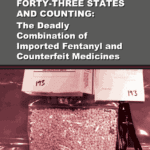By Our Experts
Shepherd M (2019) New pathways for U.S. importation threaten Canadian prescription drug supply. Canadian Health Policy Journal,
This research paper is an update to The Effect Of U.S. Pharmaceutical Drug Importation On The Canadian Pharmaceutical Supply, published in 2010.
[...]Research into Fake Online Pharmacy Prosecutions Finds Current Policies Do Little to Stop Them
A 2017 legal review conducted by Camille Guerra and Dr. Timothy K. Mackey predates the CanadaDrugs prosecution, however it clearly illustrates the challenges faced by courts in effectively prosecuting illicit online pharmacies
[...]New Report Shows Widespread and Deadly Impact of Illegally-Imported Fentanyl
A new report released April 10, 2018 by The Partnership for Safe Medicines (PSM) illustrates the growing deadly toll that illegally-imported fentanyl is having on communities throughout the U.S. PSM’s analysis confirms reports of counterfeit medicines made with fentanyl in 43 states, with fentanyl-related deaths confirmed in 22 states. The updated findings follow a report released by PSM last September that found a presence of counterfeit fentanyl in 40 states and related deaths in 16 states.
[...]Guerra C, Mackey TK. “USA criminal and civil prosecutions associated with illicit online pharmacies: legal analysis and global implications.” Med Access @ Point Care 2017; 1(1): e104-e118.
ABSTRACT The rise of digital technologies has created a complex online environment that now includes illicit Internet pharmacies, online facilitators, advertising sites, and foreign entities. Collectively, these networks create significant patient safety risks, including acting as unregulated access points encouraging prescription drug use. Although law enforcement is active in combatting this form of cybercrime,…
[...]New Report Shows Widespread and Deadly Impact of Illegally-Imported Fentanyl, April 2018 (Archived)
A new report released April 10, 2018 by The Partnership for Safe Medicines (PSM) illustrates the growing deadly toll that illegally-imported fentanyl is having on communities throughout the U.S. PSM’s analysis confirms reports of counterfeit medicines made with fentanyl in 43 states, with fentanyl-related deaths confirmed in 22 states. The updated findings follow a report released by PSM last September that found a presence of counterfeit fentanyl in 40 states and related deaths in 16 states.
[...]Making Canada America’s Medicine Cabinet Is Not The Solution To High Drug Prices
Marv Shepherd, President of Board of Directors for the Partnership for Safe Medicines, reexamined the possible effects on Canada’s drug supply should the U.S. legalize drug importation…
[...]Shepherd M (2018) U.S. Drug Importation: Impact on Canada’s Prescription Drug Supply. Health Econ Outcome Res Open Access 4: 146.
This research paper is an update to The Effect Of U.S. Pharmaceutical Drug Importation On The Canadian Pharmaceutical Supply, published in 2010.
[...]Mackey, Tim K.*, and Bryan A. Liang*. “Pharmaceutical digital marketing and governance: illicit actors and challenges to global patient safety and public health.” Globalization & Health 9, no. 1 (November 2013): 1-21.
BackgroundDigital forms of direct-to-consumer pharmaceutical marketing (eDTCA) have globalized in an era of free and open information exchange. Yet, the unregulated expansion of eDTCA has resulted in unaddressed global public health threats. Specifically, illicit online pharmacies are engaged in the sale of purportedly safe, legitimate product that may in fact be counterfeit or substandard. These…
[...]Nemlekar P, Shepherd M*, Lawson K, and Rush S. Web-Based Survey to Assess the Perceptions of Managed Care Organization Representatives on Use of Copay Subsidy Coupons for Prescription Drugs. J Manag Care Pharm. 2013;19(8):602-08.
ABSTRACT BACKGROUND: Promotion of prescription drug coupons and vouchers by pharmaceutical manufacturers has increased in recent years. These coupons and vouchers usually subsidize patients’ cost-sharing obligations. In other words, drug companies pay for a patient’s portion of the drug cost, and the remaining cost is paid by the patient and the patient’s health plan. This…
[...]Shepherd M*. Examination of Why Some Community Pharmacists Do Not Provide 72-Hour Emergency Prescription Drugs to Medicaid Patients When Prior Authorization Is Not Available. J Manag Care Pharm. 2013;19(7):523-33.
BACKGROUND: Existing federal law requires that a 72-hour emergency supply of a prescription drug be dispensed to Medicaid patients when prior authorization (PA) is not available and the medication is needed without delay. The pharmacist’s role is to contact prescribers and inform them that PA is needed. If the prescriber cannot be reached, the pharmacist can dispense a 72-hour emergency supply.
OBJECTIVES: To determine (a) the reasons why some community pharmacy owners/managers, staff pharmacists, and technicians are not compliant with the law; (b) how often the decision is made; and (c) estimate how often pharmacies do not dispense the 72-hour emergency supply when PA is not available.
[...]
